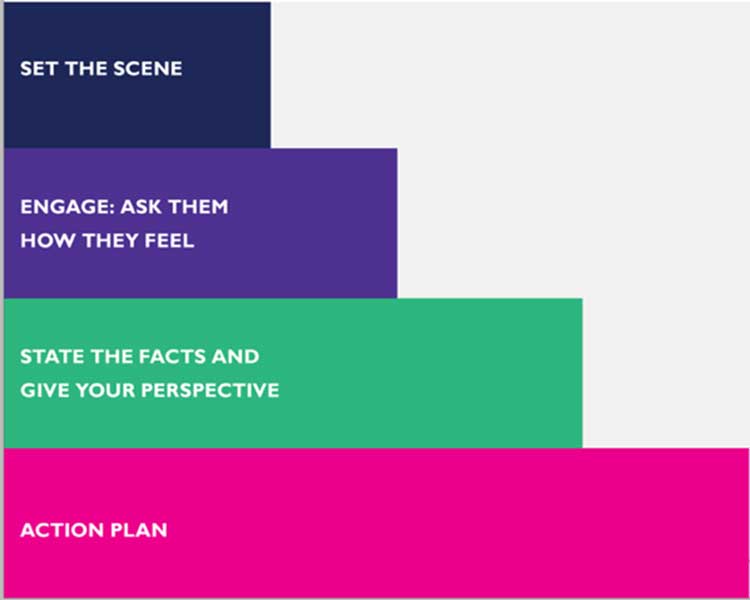Why Coaching is the Key to Improved Performance Management

As people in general – and millennials in particular – become increasingly resistant to being told what to do, it is clear that the old-fashioned performance management systems are no longer working. As a result, the non-directive nature of coaching holds the key to creating a positive learning environment that encourages individuals to develop and thrive. It’s therefore not surprising that more and more organizations are committed to creating a coaching culture that encourages continual learning and development as opposed to the traditional annual performance appraisal process.
A conversation once a year just isn’t enough – it’s the conversations you have during the other 364 days that really count. As a leader, it means developing a new range of coaching skills and techniques that equip you to have confident coaching conversations that motivate your people to achieve their full potential and maximize their performance.
Feedback is the breakfast of champions
Coaching provides a ‘safe’ environment where individuals can set new goals and ask for support without the fear of looking ‘weak’ in front of their peers. As a CEO, it enables you to meet with people in your team on a formal or informal basis to give them meaningful feedback in a way that does not make them feel as though they are being singled out or criticized. As Bill Gates said, “We all need people who give us feedback. That’s how we improve.” However, many people shy away from giving feedback because they don’t want to upset the apple cart or fear the emotional reaction their conversation might provoke. As a leader, it’s particularly important to role model coaching best practice. This means being brave and front-footed. Remind yourself that your goal is to help others improve performance at an organisational and individual level – whether it’s by closing down a team’s blind spot, developing a department’s skills and capability or boosting one person’s confidence.
When to give feedback
You only need to look at websites such as TripAdvisor or Airbnb to recognize the important role feedback plays in our world today. However, for feedback to be powerful it needs to be specific and timely so don’t save it for formal reviews. Avoid general comments such as, “You are a good presenter” and instead say, “I was very impressed by the way you engaged the audience and communicated your key points at our last conference.” Your feedback will carry much more weight if it is rooted in a time and place, helping them understand the specific behaviour you want to see more of. A great way to help the other person hone a new skill is to feedback before and after they put it into practice. This way you are setting them up for success by helping them get their head in the right place beforehand and encouraging them to review their performance afterwards so they can keep raising the bar.
What you should give feedback on
You can give feedback on anything that the other person can do something about. This could be feedback on their communication style, working practices or more general behaviour. The secret to giving meaningful feedback is to ensure it is performance-focused as opposed to people-focused. In other words, it’s not about whether they are a good or a bad person, it’s about helping them drive their performance through clear and direct language. The most important thing is that the feedback is specific and direct. Whenever possible avoid giving another person’s feedback. For feedback to be really effective it needs to come straight from the horse’s mouth. Bear this in mind the next time a colleague asks you as their CEO to step in and deliver difficult feedback on their behalf. Remind them that it is their responsibility to have the conversation, and if necessary, offer to help coach them through the feedback process.
How to give feedback
In order for feedback to make a real impact on the other person’s performance, it’s crucial that you tailor it to the particular needs and style of the individual. The four steps below will help you deliver feedback in the most impactful way:
4 Steps to Giving Meaningful Feedback
Step One: Set the scene
First, be proactive and introduce the feedback by setting the scene using clear language to describe exactly what feedback you would like to give them. Remember to root it in a set time and place. For example, “I’d like to talk to you about how you pitched your idea in the after-lunch slot of our team meeting.”
Step Two: Ask them how they feel
A powerful way to engage the other person in the feedback process is to ask them how they feel about their performance. This helps you assess how they view the situation. For example, if they are unduly critical about their skills it could suggest they lack confidence. Alternatively, if they are overly positive, it could indicate they have a blind-spot.
Step Three: State the facts and your perspective
Having listened with empathy to what they have to say, you need to use direct and honest language to provide feedback. Don’t be tempted to sugar-coat the facts, use specific examples to illustrate how you felt they performed and what areas – if any – could be improved. Harness your self-control to remove emotion from your voice, maintain eye contact and breathe deeply so that you can speak with confidence. Don’t forget to describe the impact their performance had on you and others. It’s important they understand the overall impression they gave.
Step Four: Agree on an action plan
The last step in the feedback process is to transfer ownership to the other person by agreeing to the next steps. You need to get their input to agree what actions or steps they are going to commit themselves to start, stop or continue doing in order to improve their performance.
Finally, don’t just feedback when things are going wrong. Take the time to give praise where praise is due. It’s a human trait to crave recognition and there is nothing better for motivating the other person than giving them meaningful praise for a job well done. Remember to practise what you preach – demonstrate how much you value feedback by asking for it in return. Feedback will help you identify any blind spots or areas for your own development. It can also boost confidence and encourage trust and knowledge sharing. By helping to foster a coaching culture in this way, everyone will reap the rewards of being a more engaged and motivated organization.
Have you read?
# Best CEOs In The World 2019: Most Influential Chief Executives.
# World’s Best Countries To Invest In Or Do Business For 2019.
# Countries With The Best Quality of Life, 2019.
# Most Startup Friendly Countries In The World.
Add CEOWORLD magazine to your Google News feed.
Follow CEOWORLD magazine headlines on: Google News, LinkedIn, Twitter, and Facebook.
Copyright 2024 The CEOWORLD magazine. All rights reserved. This material (and any extract from it) must not be copied, redistributed or placed on any website, without CEOWORLD magazine' prior written consent. For media queries, please contact: info@ceoworld.biz









